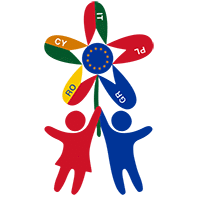Fostering children’s learning process and cognitive abilities through holistic approach and innovative methods
The PRO-LEARN project

The PRO-LEARN project responds to the Europe 2020 priorities in the area of education and training, youth and early school leaving in the context of globalization and labour market integration. As EC stated in its communication on tackling early school leaving & COM(2011) 18 final, education and training systems often do not provide sufficient targeted support for pupils to cope with emotional, social or educational difficulties and to remain in education and training.
PRO-LEARN is a large scale project as it involves 6 different organisations (public entities, NGOs, SMEs) from 5 EU countries – PL, CY, GR, IT, RO lasting 36 months.
Objectives

The project aimed to:
- reduce early school dropout through speed up the learning process
- overcome shortage of specialists at schools (psychologist, pedagogues)
- improve engagement of parents in learning processes of their children and development of their cognitive abilities
- enrich scarce offer of free-of-charge and barrier-free tools (including the ICT- based ones), for diagnosis of cognitive processes and the preferred learning style of children aged 6-14 years old on their own and by their parents and teachers/educators
- enrich scarce offer of free-of-charge training programmes and educational-oriented materials for parents, educators, devoid of technological barriers to computer use, to support pupils in the development of effective learning skills, using their resources and full potential of the brain
What you get

During the project implementation the project partnership developed four main intellectual outputs (IOs):
- ELECTRONIC TOOL FOR DIAGNOSIS OF COGNITIVE PROCESSES AND LEARNING STYLES OF YOUNGER CHILDRENfrom 6 to 10 years old– online, multidimensional, standardized and normalized tool to diagnose cognitive abilities and processes and the preferred learning style of children in pre-school / junior school age – aged 6 to 10 years old.
- ELECTRONIC TOOL FOR DIAGNOSIS OF COGNITIVE PROCESSES AND LEARNING STYLES FROM OLDER CHILDRENfrom 11 to 14 years old– multidimensional electronic tool designed for diagnosis of the preferred learning style and cognitive processes of children and adolescents at school age (11 to 14 years old). It is a standardized tool prepared according to the psychometric approach.
- TRAINING TOOLKIT FOR TEACHERS AND EDUCATORSAdults– available in a form of e-learning contains 10 online, short-term trainings (1-3 hours), in multimedia form focused on the latest discoveries of neuro-pedagogy (learning styles, how to teach children, multisensory teaching, etc.) to provide teachers with the knowledge, strategies and a range of approaches that will support them in teaching and application and utilization of the project IOs in the school and beyond school settings.
- EDUCATIONAL TOOLKIT FOR STUDENTS – EDUCATIONAL GAMES AND TASKS6-10 years old & 11-14 years old.-aims at the development of cognitive functions and supports students in the development of effective learning skills and utilization of resources and the full brain potential. It is composed of a unique on-line set of short exercises to support/ develop cognitive processes favourable effective learning and also exercises that develop various learning techniques and methods. The exercises are divided into three age-groups: 6-7 years old, 8-10 years old and 11-14 years old.
Target Groups
The target groups of the project who can benefit from the project products and take part in the projects’ activities are as follows:
direct
- primary and lower-secondary school students (6-14 years old)
- their parents
- teachers involved in the aspects of educational counselling
- primary and/or lower -secondary school teachers
- primary and/or lower -secondary school experts – school psychologist, educators
indirect
- educational institutions which offer services related to pedagogical guidance
- counselling centers
other relevant stakeholders
- local, regional authorities responsible for education
- universities/HEI
- parents and teachers associations
- platforms for education professionals such as eTwinning, School Education Gateway





